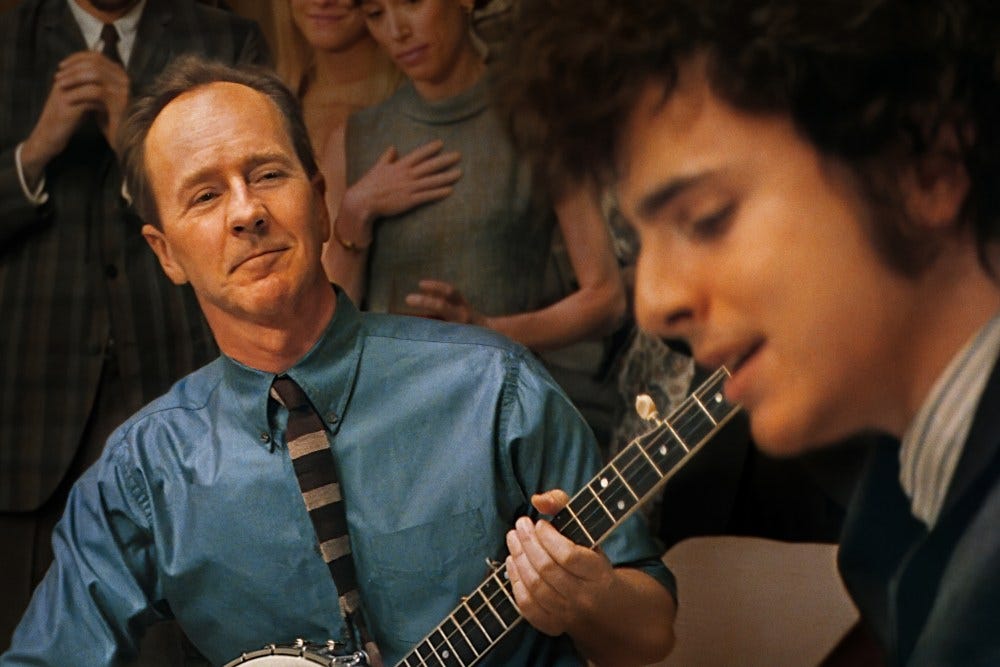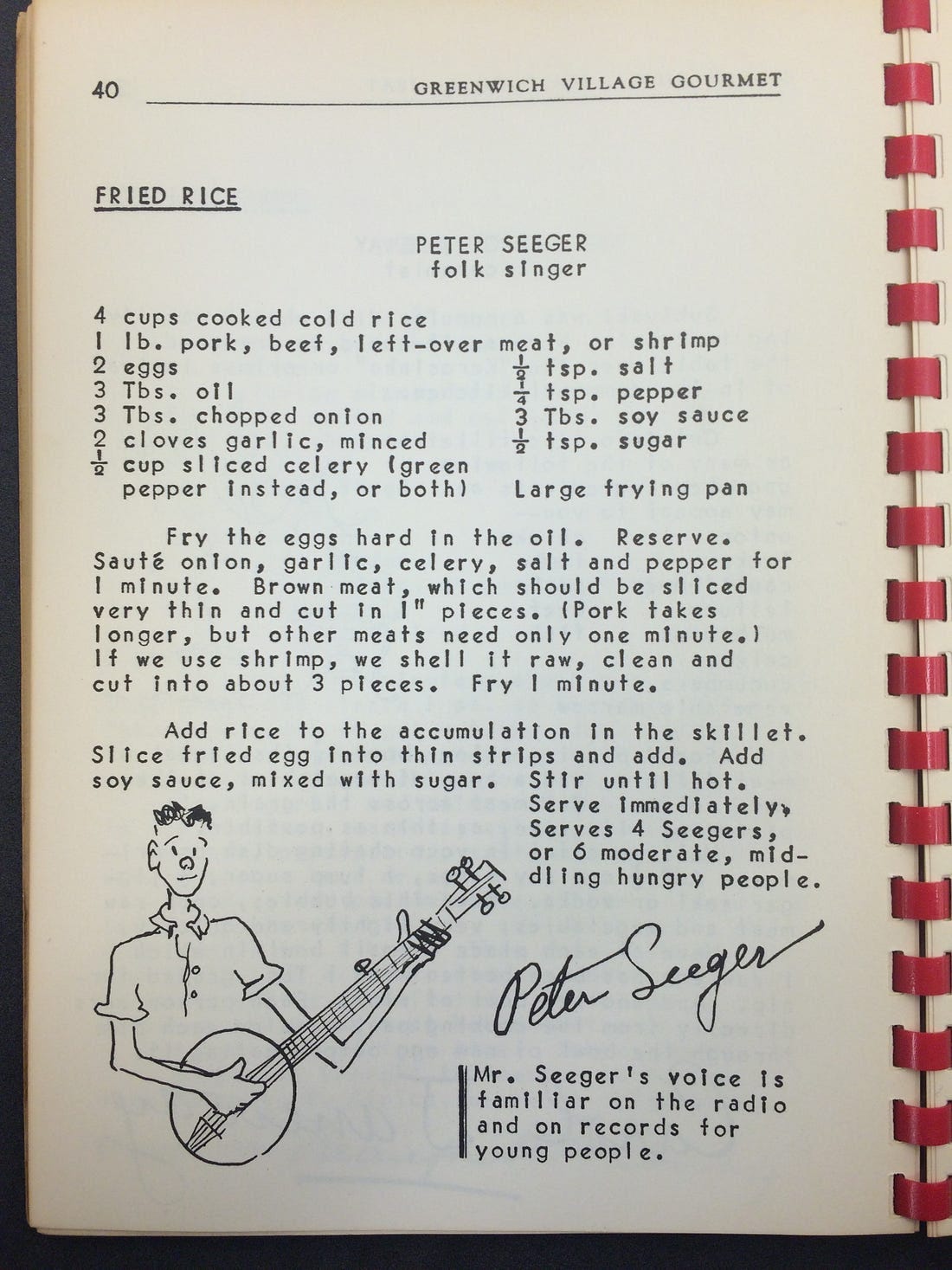I gave up expectations for Lent this year, as I brought up in conversation often enough to probably erode any virtue in it. If I may say, it was by and large a great success (and, once or twice, really, really difficult). I’m not sure you’re supposed to have a good time during Lent, but I did, a notable example being at a screening of James Mangold’s A Complete Unknown—now the second film to take its title from a lyric in “Like a Rolling Stone.”
Prior to Ash Wednesday, I’d seen trailers and held my breath, sure that the thing would drive me crazy in the wrong ways. Timothée Chalamet, for all his merit and charm, didn’t seem to look or sound enough like Dylan. Was I in for two hours of suggestion and indication?
In my adopted state of complete, compulsory open-mindedness, I was pleasantly surprised to find his character work went deeper than I could have expected had I expected. I was settling into his speaking voice by the first scene with Woody; half the runtime later, after the ‘1965’ title card, the positioning of his hand around the wine glass at the party convinced me of the homework he had done. Turns out he can act??

I kid. His skills were evident to me from the start (even if Call Me By Your Name kind of confused me, I wasn’t denying his potential). In fact, moments in this film prompted me to revisit Laurie’s ersatz proposal from Greta Gerwig’s Little Women, a scene I recall striking me in the cinema, though the particulars of my reaction have faded. This time I ugly-cried. I was Jo, I was Laurie, and I grieved for them, individually and together. Chalamet embodies something too close for my comfort, something I can’t turn away from.
That version of the story, as I said at the time, belongs to Chalamet’s Laurie: he is the emotional crux of the plot and a foil of sorts to all four sisters. In an ironic parallel, this version of the formative Dylan myth may belong not to Chalamet’s Dylan but to Edward Norton’s Pete Seeger. It’s his arc that this pastless Minnesota transplant orchestrates, and we are all along for the ride.
In the hands of Norton, whom I had forgotten how deeply I enjoy watching, Seeger is a caretaker and a peacemaker. He’s also a facilitator, though not one to get involved unnecessarily. He unfailingly keeps Woody Guthrie (Scoot McNairy) company, grants young Bobby an audience with him in the first place, then takes Bobby into his home before finally becoming a long-term nurturer for his voice. He’s curious—inquiring into the kid’s influences and interests—and dedicated—contributing to the board of the Newport Folk Festival—but not pushy. His own tastes skew purist, but he possesses a tolerance that keeps him from foisting those tastes onto fellow artists in the form of strictures, as Newport’s directors are all too keen to do. The film can be read as a chronicle of his various attempts (with varying levels of success) to get across to his protégé. At the point of the ultimate showdown, he’s dispirited by a less successful attempt, but only looking to contain the showdown, the consequences he’d increasingly feared were coming. While it may be his wife Toshi (Eriko Hatsune) who dissuades him from last-ditch action, it is neither spite nor vengeance which drives him to consider that action. It’s desperation. It’s if not I, who?

Of course there’s the artistic license that we sign up for in every biopic: Dylan composing “It’s Alright Ma” far too late, the convenient (re)appearance or conflation of certain figures. But it’s already a twist on a story many of us think we know, because Dylan, a catalyst for change within a time of change, is only as important to this story as the people he affects, whose apartments he turns up at in the middle of the night and whose lives inspire his songs. (Which, we’re reminded, he was churning out at what must have been an annoying pace.) In their final exchange before his infamous 1965 Newport set, Dylan is no more or less ‘right’ than Seeger in his goals and grievances. What happens between them, and how they do or don’t bridge the difference, drives this narrative. Norton has explained as much, with a patience and eloquence that hammers home how fit he is to take up Seeger’s mantle.
All this is not to say I don’t long for Lil Timmy Tim’s reunion with Yeet Davidson. That feature-length project is owed to the good Gen Z people of America. I’d even settle for an album.
And no one, but still no one, is on Cate Blanchett’s level.
Song rec of the week: an intriguing early take of the only song I was left wishing we’d heard
In memoriam Pope Francis, 17 December 1936-21 April 2025. No icons allowed in our business, except you.




When you’re my age and inclination (70s and pinko shitdisturber) it becomes very hard to discriminate between the thickly nostalgic yearning for that time and the art presented in the now. My partner and I enjoyed the movie greatly except for the depictions of the women swirling around Dylan, which may or may not have held some truth. Like with so many male geniuses I am left loving the art and sad about their actions in the personal realm. Who knows? I completely liked Norton in the Seeger role.